国际学术交流英语汇报
国际交流会议英文发言稿
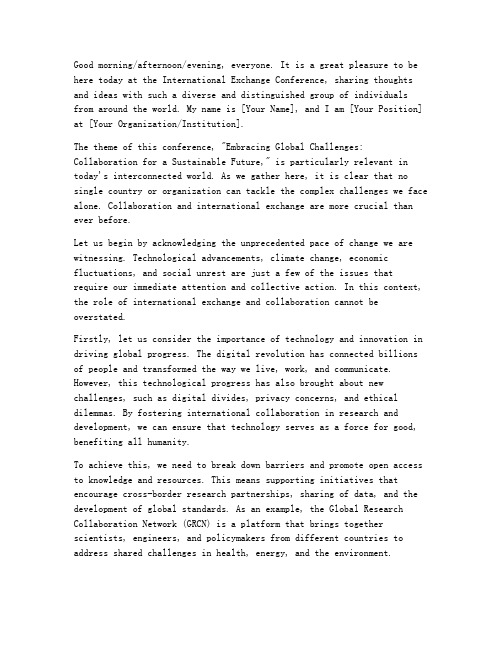
Good morning/afternoon/evening, everyone. It is a great pleasure to be here today at the International Exchange Conference, sharing thoughts and ideas with such a diverse and distinguished group of individuals from around the world. My name is [Your Name], and I am [Your Position] at [Your Organization/Institution].The theme of this conference, "Embracing Global Challenges: Collaboration for a Sustainable Future," is particularly relevant in today's interconnected world. As we gather here, it is clear that no single country or organization can tackle the complex challenges we face alone. Collaboration and international exchange are more crucial than ever before.Let us begin by acknowledging the unprecedented pace of change we are witnessing. Technological advancements, climate change, economic fluctuations, and social unrest are just a few of the issues that require our immediate attention and collective action. In this context, the role of international exchange and collaboration cannot be overstated.Firstly, let us consider the importance of technology and innovation in driving global progress. The digital revolution has connected billions of people and transformed the way we live, work, and communicate. However, this technological progress has also brought about new challenges, such as digital divides, privacy concerns, and ethical dilemmas. By fostering international collaboration in research and development, we can ensure that technology serves as a force for good, benefiting all humanity.To achieve this, we need to break down barriers and promote open access to knowledge and resources. This means supporting initiatives that encourage cross-border research partnerships, sharing of data, and the development of global standards. As an example, the Global Research Collaboration Network (GRCN) is a platform that brings together scientists, engineers, and policymakers from different countries to address shared challenges in health, energy, and the environment.Secondly, climate change is perhaps the most pressing issue of our time. The impacts of global warming are already being felt around the world, leading to extreme weather events, rising sea levels, and the loss of biodiversity. To combat this crisis, we must work together to reduce greenhouse gas emissions, adapt to the changing climate, and promote sustainable practices.International cooperation in this area is essential. The Paris Agreement, for instance, is a landmark agreement that commits countries to take action on climate change. However, achieving the goals set forth in the agreement requires continued dialogue, coordination, and financial support. We must also focus on capacity-building and knowledge transfer, ensuring that developing countries have the resources and expertise to adapt to climate change.Thirdly, economic inequality and social unrest are growing concerns. The global economic landscape is characterized by a widening gap between the rich and the poor, with marginalized communities often bearing the brunt of economic downturns. To address this issue, we need to promoteinclusive growth, support fair trade practices, and invest in education and social welfare.International exchange and collaboration can play a significant role in fostering economic stability and social cohesion. For instance, the International Labor Organization (ILO) works to promote decent work for all and social justice. By sharing best practices and resources, countries can learn from each other and develop policies that benefit their citizens.In addition to these challenges, we must also recognize the importanceof cultural exchange and understanding. The world is becomingincreasingly diverse, and it is crucial that we appreciate and respect the cultures of others. By promoting dialogue and mutual understanding, we can build bridges of trust and cooperation, reducing the likelihoodof conflict and misunderstanding.To conclude, the International Exchange Conference provides us with a unique opportunity to reflect on the role of collaboration in addressingglobal challenges. As we move forward, I would like to propose the following recommendations:1. Strengthen international partnerships and collaborations in research, development, and innovation.2. Support the implementation of the Paris Agreement and other global agreements on climate change.3. Promote inclusive growth, fair trade practices, and social welfare policies.4. Foster cultural exchange and mutual understanding to build a more peaceful and interconnected world.In closing, I would like to express my gratitude to the organizers of this conference for bringing us together. Let us leave here today with a renewed commitment to work together, share our knowledge, and create a sustainable future for all.Thank you.。
学术交流发言稿英语范文

It is my great honor to stand here today and share my thoughts on academic exchange. Academic exchange plays a crucial role in the development of our society and the progress of human civilization. Inthis speech, I would like to discuss the significance of academic exchange, its challenges, and the ways to enhance it.Firstly, academic exchange is essential for the advancement of knowledge. In today's rapidly evolving world, new discoveries and innovations are emerging at an unprecedented rate. By engaging in academic exchange, scholars from different fields can share their research findings, exchange ideas, and collaborate on joint projects. This not only accelerates the pace of scientific and technological progress but also promotes the integration of various disciplines. As a result, we can better understand the complexities of the world and find effective solutions to global challenges.Secondly, academic exchange fosters cultural diversity and understanding. As we all know, the world is a melting pot of different cultures, languages, and traditions. Academic exchange allows us to explore and appreciate the rich cultural heritages of other nations. Through interaction with scholars from diverse backgrounds, we can broaden our perspectives, challenge our prejudices, and develop a more inclusive and tolerant mindset. This is particularly important in today's globalized world, where cultural conflicts and misunderstandings can lead to social tensions and conflicts.However, academic exchange also faces some challenges. One of the most significant challenges is the language barrier. While English has become the lingua franca of the academic world, many scholars still struggle with the language. This hinders effective communication andcollaboration between researchers from different countries. Another challenge is the issue of funding. Limited financial resources canrestrict the participation of scholars from developing countries in international conferences and research projects.To enhance academic exchange, several measures can be taken. Firstly, governments and international organizations should provide morefinancial support to scholars from developing countries, enabling themto participate in international academic events and collaborate with their counterparts. Secondly, efforts should be made to promote multilingualism in academic research. Encouraging scholars to publish their work in multiple languages can help bridge the language gap and facilitate global collaboration. Lastly, academic institutions should create a more inclusive and supportive environment for scholars from diverse backgrounds. This can be achieved by implementing policies that promote diversity, equity, and inclusion.In conclusion, academic exchange is a powerful tool for promoting knowledge, fostering cultural diversity, and advancing human civilization. By addressing the challenges and taking appropriate measures to enhance academic exchange, we can create a more interconnected and harmonious world. Let us all join hands and work together to promote academic exchange and contribute to the betterment of our society.Thank you for your attention.。
英文学术交流发言稿范文
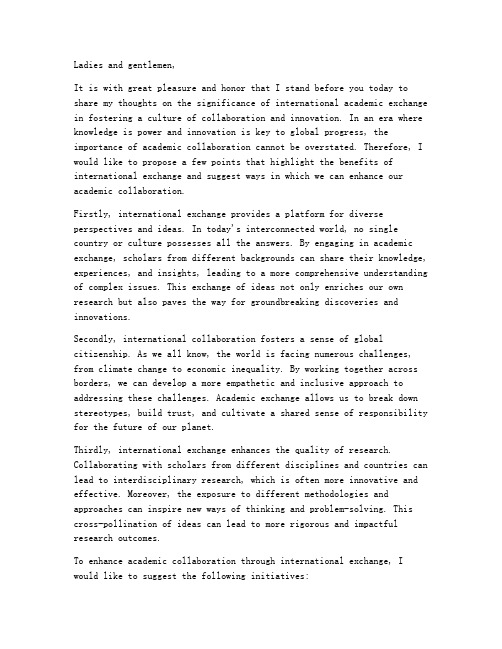
Ladies and gentlemen,It is with great pleasure and honor that I stand before you today to share my thoughts on the significance of international academic exchange in fostering a culture of collaboration and innovation. In an era where knowledge is power and innovation is key to global progress, the importance of academic collaboration cannot be overstated. Therefore, I would like to propose a few points that highlight the benefits of international exchange and suggest ways in which we can enhance our academic collaboration.Firstly, international exchange provides a platform for diverse perspectives and ideas. In today's interconnected world, no single country or culture possesses all the answers. By engaging in academic exchange, scholars from different backgrounds can share their knowledge, experiences, and insights, leading to a more comprehensive understanding of complex issues. This exchange of ideas not only enriches our own research but also paves the way for groundbreaking discoveries and innovations.Secondly, international collaboration fosters a sense of global citizenship. As we all know, the world is facing numerous challenges, from climate change to economic inequality. By working together across borders, we can develop a more empathetic and inclusive approach to addressing these challenges. Academic exchange allows us to break down stereotypes, build trust, and cultivate a shared sense of responsibility for the future of our planet.Thirdly, international exchange enhances the quality of research. Collaborating with scholars from different disciplines and countries can lead to interdisciplinary research, which is often more innovative and effective. Moreover, the exposure to different methodologies and approaches can inspire new ways of thinking and problem-solving. This cross-pollination of ideas can lead to more rigorous and impactful research outcomes.To enhance academic collaboration through international exchange, I would like to suggest the following initiatives:1. Establishing formal and informal networks: Creating platforms for scholars to connect and collaborate, such as international conferences, workshops, and seminars, can facilitate the exchange of ideas and promote long-term partnerships.2. Promoting joint research projects: Encouraging institutions to collaborate on joint research projects can help bridge the gap between different academic communities and encourage the sharing of resources and expertise.3. Developing funding mechanisms: Establishing funding opportunities specifically for international academic exchange can make it more accessible for scholars to engage in collaborative research.4. Providing language and cultural training: Ensuring that scholars are equipped with the necessary language and cultural skills to work effectively in an international environment can help overcome communication barriers and facilitate smoother collaboration.5. Fostering mentorship programs: Pairing junior scholars with more experienced mentors from different countries can provide valuable guidance and support, helping to develop the next generation of global scholars.In conclusion, international academic exchange is a powerful tool for promoting collaboration, innovation, and global citizenship. By embracing the diversity of ideas and experiences that come with international collaboration, we can contribute to a more sustainable, equitable, and prosperous future for all. Let us work together to create a world where knowledge and expertise are shared freely, and where academic collaboration knows no boundaries.Thank you for your attention, and I look forward to a lively discussion on this important topic.。
学术报告英文交流稿
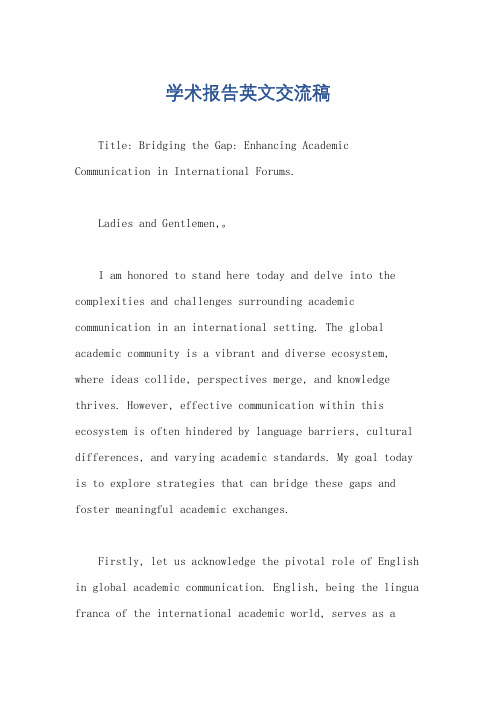
学术报告英文交流稿Title: Bridging the Gap: Enhancing Academic Communication in International Forums.Ladies and Gentlemen,。
I am honored to stand here today and delve into the complexities and challenges surrounding academic communication in an international setting. The global academic community is a vibrant and diverse ecosystem, where ideas collide, perspectives merge, and knowledge thrives. However, effective communication within this ecosystem is often hindered by language barriers, cultural differences, and varying academic standards. My goal today is to explore strategies that can bridge these gaps and foster meaningful academic exchanges.Firstly, let us acknowledge the pivotal role of English in global academic communication. English, being the lingua franca of the international academic world, serves as acommon ground for scholars from diverse backgrounds to share their research, findings, and insights. However, this also implies that non-native English speakers may face significant challenges in communicating their ideas effectively.To overcome these challenges, it is imperative for scholars to invest in enhancing their English proficiency. This includes mastering the language's nuances, such as grammar, vocabulary, and tone, as well as understanding cultural subtleties that influence communication. By doing so, scholars not only increase their chances of being understood but also contribute to the richness anddiversity of the academic discourse.Moreover, cultural differences can significantly impact academic communication. Each culture has its unique ways of perceiving, understanding, and expressing ideas. It is, therefore, crucial for scholars to be aware of these differences and strive to adapt their communication style to the international academic context. For instance, some cultures prefer a direct and assertive communication style,while others prefer a more indirect and collaborative approach. By being sensitive to these variations, scholars can ensure that their messages are received positively and are more likely to evoke meaningful discussions and collaborations.Furthermore, varying academic standards and norms across different regions and disciplines can createbarriers to effective communication. To address these issues, scholars need to be well-versed with the standards and expectations of the international academic community. This includes familiarity with citation styles, research methodologies, and publication requirements. By adhering to these standards, scholars ensure that their work is recognized and valued within the global academic sphere.In addition to these individual efforts, institutions and funding agencies also play a crucial role in promoting international academic communication. By providing scholarships and grants for international collaborations, these agencies encourage scholars from different backgrounds to work together and share their knowledge.Additionally, institutions can foster a culture of inclusivity and diversity by providing training and resources that help scholars develop their communication skills and understand different cultural perspectives.In conclusion, bridging the gap in academic communication requires a concerted effort from scholars, institutions, and funding agencies. By enhancing English proficiency, adapting to cultural differences, and adhering to international academic standards, we can foster meaningful academic exchanges and promote the free flow of ideas across borders. This, in turn, will lead to a more interconnected and enriched academic community, where knowledge thrives and scholars from all corners of the globe can contribute to the advancement of human understanding.Thank you for your attention. I look forward to engaging in a lively and fruitful discussion with you all.。
英语学术交流发言稿范文
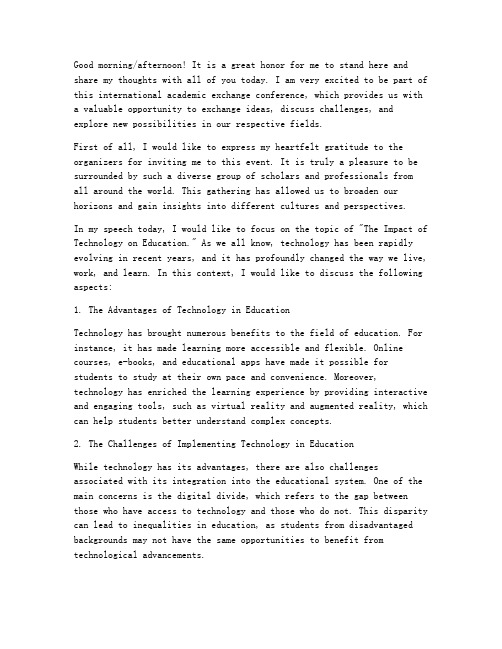
Good morning/afternoon! It is a great honor for me to stand here and share my thoughts with all of you today. I am very excited to be part of this international academic exchange conference, which provides us with a valuable opportunity to exchange ideas, discuss challenges, and explore new possibilities in our respective fields.First of all, I would like to express my heartfelt gratitude to the organizers for inviting me to this event. It is truly a pleasure to be surrounded by such a diverse group of scholars and professionals fromall around the world. This gathering has allowed us to broaden our horizons and gain insights into different cultures and perspectives.In my speech today, I would like to focus on the topic of "The Impact of Technology on Education." As we all know, technology has been rapidly evolving in recent years, and it has profoundly changed the way we live, work, and learn. In this context, I would like to discuss the following aspects:1. The Advantages of Technology in EducationTechnology has brought numerous benefits to the field of education. For instance, it has made learning more accessible and flexible. Online courses, e-books, and educational apps have made it possible for students to study at their own pace and convenience. Moreover, technology has enriched the learning experience by providing interactive and engaging tools, such as virtual reality and augmented reality, which can help students better understand complex concepts.2. The Challenges of Implementing Technology in EducationWhile technology has its advantages, there are also challenges associated with its integration into the educational system. One of the main concerns is the digital divide, which refers to the gap between those who have access to technology and those who do not. This disparity can lead to inequalities in education, as students from disadvantaged backgrounds may not have the same opportunities to benefit from technological advancements.Another challenge is the need for professional development for teachers. To effectively incorporate technology into their teaching methods, educators must be trained and equipped with the necessary skills. This requires continuous investment in teacher training programs and professional development opportunities.3. The Future of Education in the Age of TechnologyLooking ahead, the future of education seems to be increasingly intertwined with technology. As artificial intelligence, machine learning, and data analytics continue to advance, we can expect even more innovative tools and resources to be developed. These advancements will not only enhance the learning experience but also enable personalized education, where students can receive tailored instruction based on their individual needs and strengths.However, it is crucial to strike a balance between technology and traditional teaching methods. While technology can offer numerous benefits, it should not replace the essential human element in education. Teachers play a vital role in nurturing students' creativity, critical thinking, and social skills, which cannot be easily replicated by machines.In conclusion, the impact of technology on education is undeniable. It has the potential to revolutionize the way we learn and teach, but it also poses challenges that we must address. By working together, we can ensure that technology is used effectively to enhance the quality of education and bridge the gap between different groups of students.Thank you for your attention, and I look forward to engaging in further discussions with all of you during this conference.Thank you.。
国际学术交流英语 英语
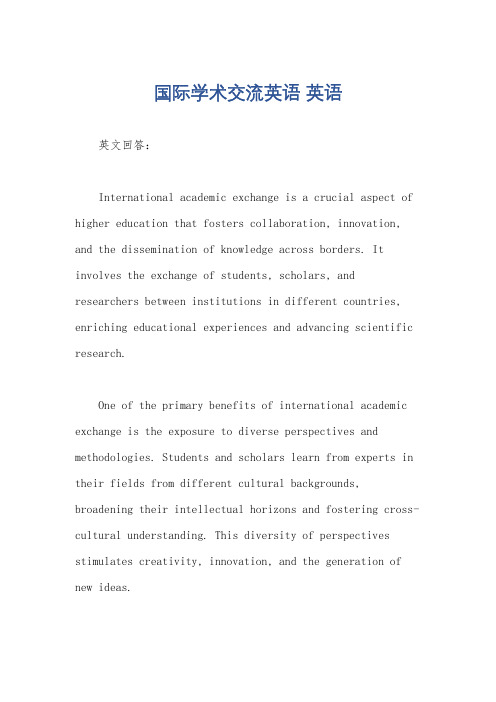
国际学术交流英语英语英文回答:International academic exchange is a crucial aspect of higher education that fosters collaboration, innovation, and the dissemination of knowledge across borders. It involves the exchange of students, scholars, and researchers between institutions in different countries, enriching educational experiences and advancing scientific research.One of the primary benefits of international academic exchange is the exposure to diverse perspectives and methodologies. Students and scholars learn from experts in their fields from different cultural backgrounds, broadening their intellectual horizons and fostering cross-cultural understanding. This diversity of perspectives stimulates creativity, innovation, and the generation of new ideas.International academic exchange also facilitates the transfer of knowledge and skills. Students and researchers gain access to specialized knowledge, cutting-edge research facilities, and advanced technologies through exchange programs. This exposure enhances their academiccapabilities and prepares them for careers in a globalized world.Furthermore, international academic exchange promotes collaboration and networking. Collaborative research projects between institutions in different countries foster interdisciplinary approaches, pooling resources and expertise to address complex global challenges. Networks established through exchange programs facilitate ongoing communication and knowledge sharing, sustaining collaboration beyond the exchange period.Cultural exchange is another significant aspect of international academic exchange. Students and scholars immersed in different cultures develop a deeper understanding of global perspectives, break down stereotypes, and foster empathy for diverse communities.This cultural exchange enriches their personal and professional lives, preparing them to thrive in an increasingly interconnected world.In conclusion, international academic exchange plays a vital role in advancing higher education and research. It promotes intellectual growth, facilitates knowledge transfer, fosters collaboration, and enhances cross-cultural understanding. By embracing international exchange, institutions create opportunities for students, scholars, and researchers to shape a more interconnected and knowledge-driven global community.中文回答:国际学术交流是高等教育中至关重要的一环,它促进了跨境合作、创新和知识传播。
国际学术交流英语心得体会范文
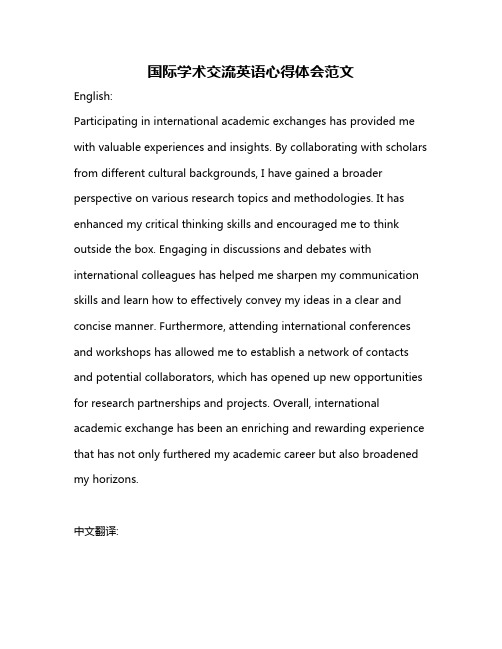
国际学术交流英语心得体会范文English:Participating in international academic exchanges has provided me with valuable experiences and insights. By collaborating with scholars from different cultural backgrounds, I have gained a broader perspective on various research topics and methodologies. It has enhanced my critical thinking skills and encouraged me to think outside the box. Engaging in discussions and debates with international colleagues has helped me sharpen my communication skills and learn how to effectively convey my ideas in a clear and concise manner. Furthermore, attending international conferences and workshops has allowed me to establish a network of contacts and potential collaborators, which has opened up new opportunities for research partnerships and projects. Overall, international academic exchange has been an enriching and rewarding experience that has not only furthered my academic career but also broadened my horizons.中文翻译:参与国际学术交流为我提供了宝贵的经验和见解。
外国人学术交流会发言稿

外国人学术交流会发言稿Ladies and Gentlemen,Good morning! I am honored to have the opportunity to speak at this academic exchange event. It is a great pleasure to be surrounded by so many talented and passionate scholars from all around the world. Today, I would like to share with you some thoughts on the importance of international academic cooperation and the impact it has on the advancement of knowledge and the development of our society.As we all know, the world is becoming more interconnected and interdependent. In this era of globalization, the exchange of ideas and knowledge is more crucial than ever. It is through collaboration and cooperation that we can address the most pressing issues facing our world today, from climate change and poverty to disease and conflict. Therefore, it is imperative for us as academics to engage in international cooperation, to share our expertise and insights, and to work together towards common goals. One of the key benefits of international academic cooperation is the diversity of perspectives it brings. When researchers from different countries and cultures come together to tackle a problem, they bring with them a wide range of experiences, knowledge, and approaches. This diversity of perspectives can lead to innovative solutions and breakthroughs that may not have been possible without collaboration. By working together, we can leverage the unique strengths of each individual and create a synergy that has the potential to transform the way we think and do things.Another important aspect of international academic cooperation is the opportunity it provides for capacity building and skill development. By collaborating with colleagues from different parts of the world, we can learn new methodologies, gain new insights, and acquire new skills that can enrich our own research and teaching. This can also help to bridge the gap between developed and developing countries, as it provides an avenue for the transfer of knowledge and expertise that can empower researchers and educators in less developed regions.Moreover, international academic cooperation can also lead to increased research productivity and impact. By working with colleagues from different countries, we can access new resources, facilities, and funding opportunities that may not be available in our own countries. This can enable us to conduct more ambitious and high-impact research projects, and to reach a wider audience with our findings. In addition, collaboration with researchers from other countries can also enhance the visibility and credibility of our work, as it can lead to co-authored publications, presentations at international conferences, and other forms of scholarly communication.Of course, international academic cooperation is not without its challenges. One of the main challenges is the language barrier, as not all researchers are proficient in English, which is the dominant language of academic communication. This can hinder effective collaboration and communication, and it can also lead to the marginalization of researchers from non-English speaking countries. Therefore, it is important for us to be mindful of this issue, and to actively work towards creating more inclusive andequitable research environments.Another challenge is the cultural and institutional differences that exist between countries, which can impact the way research is conducted and disseminated. This can lead to misunderstandings, conflicts, and power imbalances within collaborations, and it can also create barriers to the dissemination and application of research findings. Therefore, it is important for us to be sensitive to these differences, and to work towards building trust, understanding, and mutual respect in our collaborative endeavors.In conclusion, international academic cooperation is a powerful tool for advancing knowledge and addressing global challenges. It enables us to access a diversity of perspectives, to build our capacity and skills, to increase our research productivity and impact, and to foster understanding and collaboration across borders. However, it also poses challenges that we must be mindful of and actively work to overcome. By embracing international academic cooperation and striving to create more inclusive and equitable research environments, we can harness the collective wisdom and creativity of scholars from all around the world, and make a meaningful contribution to the betterment of our society. Thank you.。
- 1、下载文档前请自行甄别文档内容的完整性,平台不提供额外的编辑、内容补充、找答案等附加服务。
- 2、"仅部分预览"的文档,不可在线预览部分如存在完整性等问题,可反馈申请退款(可完整预览的文档不适用该条件!)。
- 3、如文档侵犯您的权益,请联系客服反馈,我们会尽快为您处理(人工客服工作时间:9:00-18:30)。
The generalized GIS technical requirements
Data acquisition and processing
Data analysis and calculation
Data Management and Integration
The generalized GIS technical requirements
5V
Big Data
Big Data
How big is the big data?
Big Data
Big Data
This is a 64GB micro SD card. It weighs about 4/10 of 1 gram, and costs about $53.
Real-time monitoring of the natural environment, social environment and scan increasingly diverse“ Data is growing at an alarming rate in the Pan Geographic Information Age。 Therefore, the concept of pangeographic information age also need to generalization, generalized GIS emerged
Map GPS
Generalized GIS
GPS now be used for navigation
The generalized GIS technical requirements
Under the joint efforts of Surveying, geography, computer science and other disciplines, after decades of development, the traditional GIS technology system has been more mature. However, ubiquitous geographic information appears on the GIS generalization put forward new technical requirements .
Map GPS
Generalized GIS
Generalized GIS
the broad geographic information system “and deal with location-related information technology systems:
Generalized GIS
Generalized geographic information processing system:
Arc/Info MapGis GeoStar SuperMap
Generalized GIS
the broad geographic information system “and deal with location-related information technology systems:
Big Data
Volume Variety Velocity Veracity Value
Characteristics
It’s different from the Seadata.
These characteristics Challenge your existing architecture and your thought processes.
Data acquisition and processing
Many types of generalized GIS facing the spatio-temporal data. The new demand for data collection technology including indoor map collection technology, true three-dimensional measurable multisource geographic information acquisition technology, mobile terminal positioning technology, the Internet contains the geographic information collection technology
From Urban Computing To Social Computing
What Is Urban Computing ?
Urban Computing gather is sensors of city 、buildings、road net 、vechicles and residents are caculated as a unit ,synergy with the calculation process of city level.
Under Generalized GIS
Although
the urban computing and social computing are complex , but from oriented geospatial calculations to compute the city scene, and even the whole of society is calculated , it can be expected that geo-computing and urban computing will integration better , and services for modern society’s Management and people’s life.
Map GPS
Generalized GIS
Generalized GIS
Generalized GIS
the broad geographic information system “and deal with location-related information technology systems:
The Era Of Big Data
The emergence of Big Data made the geo-computing becoming popular, the Clound computing and Common computing rise the scale of Geo-computing 、accuracy and efficiency,at the same time,also promoted the integration of urban computing and social computing.
The generalized GIS technical requirements
Data analysis and calculation
General GIS in terms of data analysis and calculation from multi-factor spatial and temporal correlation, based on the location of the mass of moving objects trajectory analysis, the characteristics of complex network geographic space, and other aspects. Strengthen the theoretical research in the field of artificial intelligence, machine learning, technology research and development, enrich general GIS analysis ability.
Generalized GIS
What is generalized GIS ?
Generalized GIS
Second: the broad geographic First: the treatment of generalized information systems, and geographic information system technical systems handle location-related information
Group Members: Lan Xin Zhang Wen Zhu Xiao Fan Cao Hai Lu
Members Introduction Xin : Team Leader ,Responsible for the first part ZHU Xiaofan : Members, Responsible for the second part CAO Hailu : Members, Responsible for the third part ZHANG Wen : Members, Responsible for the last part
The Era Of Big Data
Urban urban computingData provide a mining perception
wonderful city life to presidents , and it also can make city more smart
Intelligent extraction Services provide
Social
computing aims to study the running rule and the trend of development of social system with the tech of computing, and help people to communicate and collaborate better.
